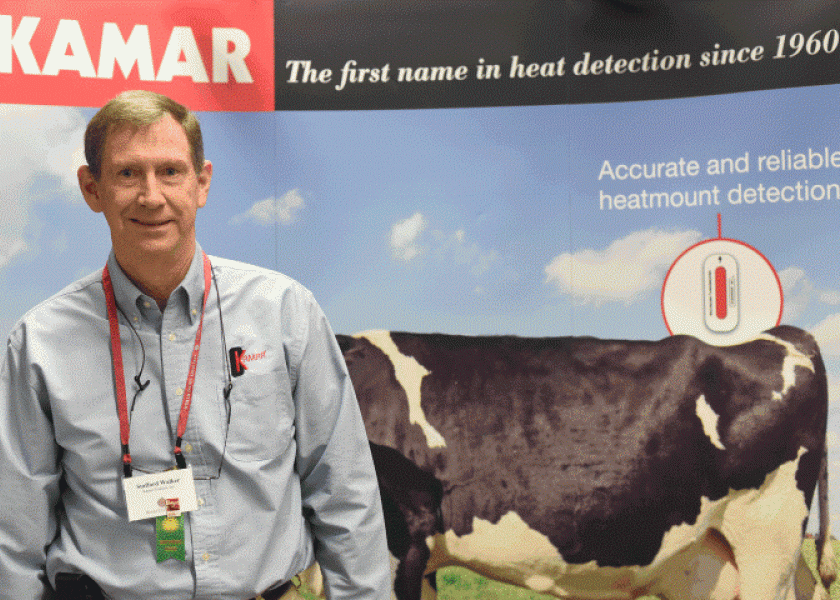Threads of Success

Finding ways to keep pace with the ever-changing needs and wants of their dairy producer customers is a common thread linking the more than 800 exhibitors taking part in the World Dairy Expo (WDE) Trade Show. For businesses like The Coburn Company, of Whitewater, Wis., and Kamar Products, Inc., in Zionsville, Ind., the effort has spanned several generations.
The Coburn Company, Inc., a manufacturer and distributor of dairy and farm equipment, has been exhibiting at World Dairy Expo since the mid-1970s.
“The change that really stands out, of course, is how much bigger farms are today,” says company president Joe Coburn. “Today’s farms require more automation and efficiency. There’s a need for better genetics, better feeding and better management overall.
“Our goal as a company is to make sure we’re able to satisfy all the needs of customers on the technical and installation side of things while delivering products in a timely fashion.”
Founded in 1925, The Coburn Company is a fourth-generation, family-owned business. The company’s product lines include milking and barn equipment, animal health and care products, cleaning and sanitizing supplies and more. Products are sold through a network of dealers operating in all 50 states and more than 60 countries worldwide. Outlets include milk equipment dealers, general farm stores, veterinarians, tack stores and rural hardware stores.
The company’s presence at Expo is designed around offering support to representatives from its dealer network. “It gives us the opportunity to show them the new technology and equipment we’re selling,” says Coburn, whose dad, James, ran the company when it first came to the Expo.
“At the same time, of course, we’re always looking to make contacts with potential new customers," he says. "We don’t necessarily have to make a sale during Expo to make being here worthwhile. We just want to make good contacts, so maybe two or three months down the road, we will get that sale.”
Having the opportunity to connect with dairy producers is another major benefit of participating in the Trade Show. “The contact we have with dairy farmers at the show gives us the chance to start a direct dialogue about what’s going on at their farms,” Coburn says.
“Through those interactions, we can get a better idea about which products we should be manufacturing or sourcing," he says. "We can also get ideas about what we can do to improve products we’re already selling from the people who are using them every day. Having a presence here helps guide what we do in the coming year.”
Coburn’s bottom line assessment of Expo: “This is a very professional show offering the best in genetics, technology, and products and services that are in demand in today’s dairy industry,” he says. “It’s really the Cadillac of all shows.”
Stafford Walker, president of Kamar Products, Inc., best known for its heat detection patch, has also seen plenty of changes in the dairy industry in the 25 years he’s been representing his company at the Expo.
“With all of the consolidation and farms continuing to get bigger over the years, producers are using more sophisticated tools these days,” Walker says. “There’s certainly been a trend toward more use of electronics in all aspects of the business, including heat detection.”
Kamar’s approach has been to zero-in on smaller and mid-size dairies (150 to 700 cows). “These are farms that aren’t able to justify the investment in some of the electronic systems for heat detection that are now being used,” he explains.
“Cows and reproductive physiology really haven’t changed all that much over the past 25 years. Dairy producers still have the same need of knowing when a cow is in heat and ready for insemination. We have a tool that can meet their needs,” Walker says.
Taking part in the Trade Show is a perfect fit in Kamar’s marketing strategy. “We’ve always had our booth in the Coliseum because we want to be near the genetics companies’ exhibits and the cattle shows,” Walker notes.
“We want farmers to know that we’re still here and we’re committed to serving the market. And of course, there are always new farms and new opportunities both here and around the world to introduce our products to people who are just becoming familiar with them,” he says.
The large number of international visitors at Expo (more than 3,200 registered people from 94 countries in 2014) also plays a role in Kamar’s decision to exhibit here. “Since we first started coming to Expo, we’ve expanded from being strictly a U.S. company to being a global business," Walker says. "Most of the international markets we now serve have been developed through contacts we’ve made at Expo. This is a great place to make international connections.”
Joshua Walker, Stafford’s son and product manager for Kamar Products, Inc., sums up the company’s relationship with the Trade Show this way: “Ten years ago, we were doing around a dozen shows each year. We love being at trade shows because it gives you the chance to talk to people face-to-face. But it also involves significant commitments of time and money, so we’ve had to scale back.
“Now, Expo is the only trade show we do,” he says. “It’s great for our company because there are so many people from exactly our type of operation here. We can’t fathom missing this show.”







